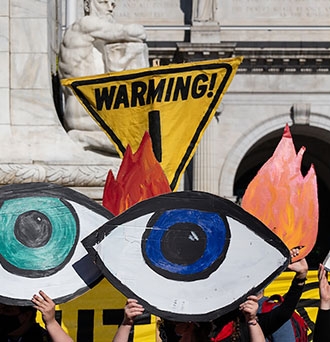
Two big issues dominated the 2020 election: the economy and the coronavirus pandemic. But voters concerned about climate change still helped Joe Biden win the White House.
Environmental advocates say their message about the urgency of curbing emissions and addressing other environmental issues broke through. A surge of voters — many of them young and casting ballots for the first time — helped the man with the most ambitious climate plan of any major-party candidate secure the presidency.
Yet as vote tallies are finalized, it’s also clear the potency of global warming at the ballot box has its limits, for now.
A sizable chunk of voters who say they are concerned about climate change still ended up voting for President Trump anyway — even though the president often dismisses it as a “hoax.”
A two-thirds majority of voters say climate change is a “serious problem," according to exit polls conducted by Edison Research for The Washington Post and other publications. It’s a notion backed by the vast majority of scientists who say human activity is dangerously warming the planet.
Yet among voters who said climate change is a serious problem, 68 percent voted for Biden, while 29 percent backed Trump, that same survey shows.
As is the case with so many other issues, political polarization may have locked people into voting for their own party.
Edward Maibach, director of George Mason University’s Center for Climate Change Communication, said his research indicates that many moderate Republicans who think climate change is real still aren’t willing to cross the aisle when deciding who should be the next president.
“They do care about the issue,” Maibach said. “But they clearly don’t care about it as a top-tier issue.”
“In a general election, especially a general election,” he added, “the question that voters are asking themselves has very little to do with the issues, and a lot more to do with their tribe.”
Economic, rather than environmental, considerations may have also been top of mind for voters wrenched by a spike in jobless rates due to the viral outbreak.
“People react to climate change with a real sense of urgency when they are prompted to consider the subject,” said Scott Segal, a lawyer at the legal and lobbying firm Bracewell, which represents refineries and other industrial interests. “But voting is a quiet task. When left to their own devices without prompting, it was hard for voters this year to let climate change break through when the pandemic, recession and policing was on their mind.”
Still, the issue of climate change was brought into relief in 2020 as California battled historic wildfires and the Atlantic and Gulf coasts weathered a record-breaking hurricane season.
The fact only one candidate sought to address what many young voters see as their generation's defining issue helped drive turnout.
With so much early voting due to the pandemic, the surge in voters under 30 was clear before Election Day. An early analysis from Tufts University found youth turnout was up 8 percent over 2016 levels.
“Young people care deeply about this. That was key to his victory," Gene Karpinski, head of the the League of Conservation Voters, which backed Biden, told reporters earlier this month.
"So the Trump voters," he added, “don't understand and don't care about climate. But that's not where the people who elected the new president were.”
The Environmental Voter Project, a get-out-the-vote nonprofit that doesn't endorse candidates, said its nine-month campaign texting and calling people who say they are care about the environment across a dozen states helped turn 607,000 nonvoters into voters.
That includes nearly 57,000 new voters in Arizona and 69,000 in Georgia — both well over the margin Biden beat Trump in either state.
“In elections this close, there are dozens of things that are difference makers,” Nathaniel Stinnett, head of the project, said. “But there’s no doubt in my mind that climate voters were one of them.”
